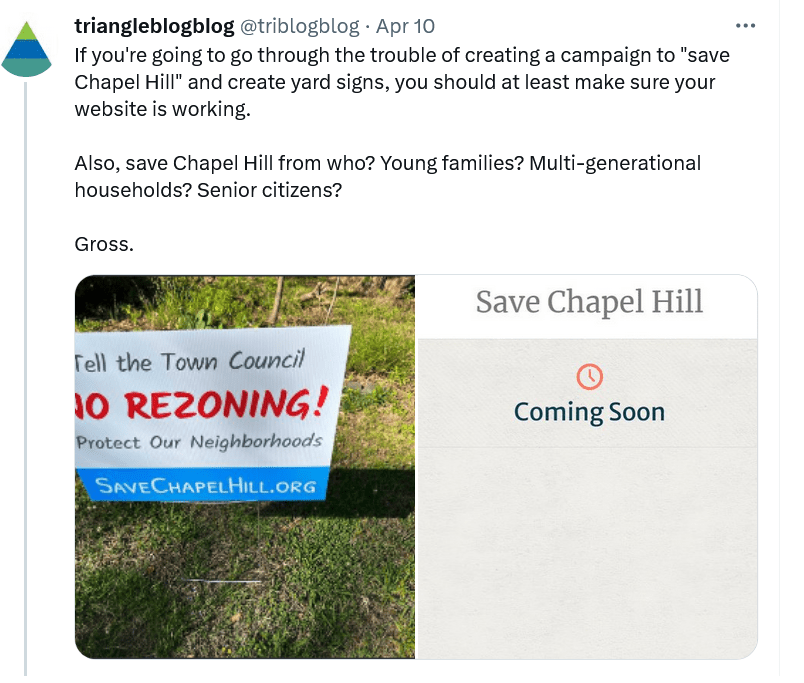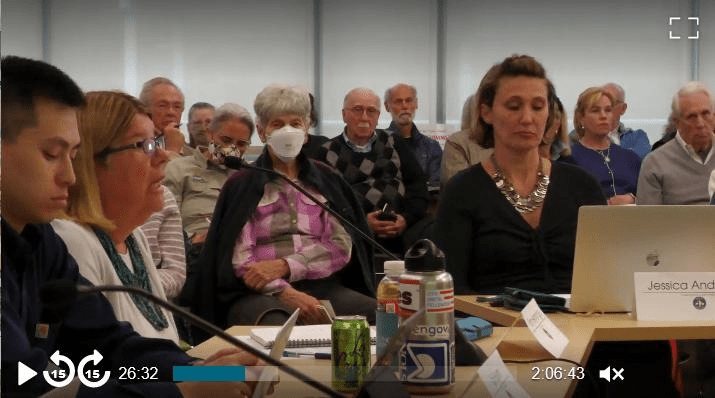On Monday, April 10, hours before the Chapel Hill Town Council was set to discuss a proposal to permit more housing to be built in the community, a sign appeared on Lakeshore Drive, nestled on the lawn of a million-dollar home.
“Tell the Town Council,” it read in black letters. Written below, the words “NO REZONING!” appeared, this time in a bold, red font. And, in case anyone didn’t get the message, below, again in black, appeared the words “Protect Our Neighborhoods.”
Below this message appeared a new URL—SaveChapelHill.org.

By Monday evening, dozens of these signs had found their way to opponents of the town’s modest plan to permit more housing to be built. Council member Adam Searing encouraged those in attendance to see the proposal not as a good-faith effort to solve our housing crisis, but instead as the opening salvo of a political campaign for which they had already prepared signs and a slogan.
As the old political adage has it, there are only two campaign messages in politics—time for a change or stay the course. In local politics, it’s even possible to predict the platforms—do we grow and adapt to new challenges, or do we dig in our heels and protect what we have?
In Chapel Hill, the dig-in-our-heels crowd has been at it for decades, always predicting doom and gloom if the town adds another apartment building, updates its infrastructure, or permits even the slightest change to one of our neighborhoods.
Their playbook has been successful in the past, so they’ll likely use it again this year. First, they find an issue that they think will play to their base—white, wealthy, older homeowners who are good Democrats until they get stuck in traffic one day and decide they’ve had enough. In 2017, the issue was whether the Berkshire, home to hundreds of Chapel Hill residents, was an eyesore that ruined the experience of going to the Whole Foods next door. The anti-Berkshire campaign worked so well last time that they just reused the signs for 2019. Buildings don’t fight back.
In 2021, the issue was, first, a years-in-the-making effort to address stormwater along Booker Creek, which the council decided to put on hold so an amateur-led “working group” could spend two years canoodling about rain gardens (we’re still waiting for their final report). Then the build-nothing crowd landed on attacking an approved development (Aura), going as far as to accuse council member Karen Stegman of “betraying” her hometown. It didn’t work. On election day, she was the top vote-getter.
Once the target is identified, the cul-de-sac cabal sets about trying to mask the fact that they’re the same old crowd making the same old arguments. They start a new organization, often one that’s so transparently fake it gives AstroTurf a bad name (SaveChapelHill.org just has a “coming soon” banner. If this issue doesn’t stick, we wouldn’t be surprised if the site is abandoned.). If they’re lucky, they’ll recruit a newcomer to serve as their mouthpiece, authoring a petition that makes apocalyptic claims about the impact of a minor change to the town. It doesn’t matter if it’s true, as long as it gives them the opportunity to collect email addresses.
Aware that its voters lean Democratic and are thus sympathetic to environmental causes and demands for affordable housing, they’ll develop platforms that provide just enough cover to fool those who don’t look too closely but won’t come close to solving the problem, the political equivalent of cleaning your room by just tossing everything into the closet.
But the most worrying step comes next, when they cast aspersions on anyone who disagrees with them. They’ll never acknowledge their own privilege and lack of expertise but will gladly accuse others of being disloyal to their community, on the payroll of developers, and unsuited for public office. For them, debates about land use, budget priorities, and town services are not debates at all, but rather a contest between those who value their community (them) and those who do not.

For those of us who have been following Chapel Hill politics for a while, Save Chapel Hill is just the latest in a long parade of efforts to hold our community back. But even still it’s worrying that such a slogan seems to be resonating with a silver sliver of the town’s population.
Save Chapel Hill? From whom? For what?
Answering these questions leads to some uncomfortable places. As the town’s new planning director, Brittany Waddell, noted on Monday night, the council is considering whether they want to keep in place policies that were designed to exclude people of color and people with low incomes from living in most of our town’s neighborhoods.
Are we really going to debate in 2023 whether we want to perpetuate exclusionary zoning in Chapel Hill? How will that benefit our community?
When Save Chapel Hill supporters talk about the town’s values are they only thinking about how much their home has appreciated since they moved here?
The people who held the Save Chapel Hill placards on Monday night probably imagine they’re protecting some past vision of Chapel Hill, one they’ve colored rose with nostalgia. But that Chapel Hill wasn’t necessarily a good place for people who didn’t look like them, and we can’t return to the days when we were an isolated college town in an economic backwater.
As Mayor Pam Hemminger reminded everyone on Monday, there are 40,000 people driving into Chapel Hill every day to go to work. We can imagine that some of those people don’t mind the commute. But we’re certain that there are many people who would love living in a duplex in Ridgefield, a small home on a small lot in Colony Woods, or in a garage apartment in Westwood. Why wouldn’t we welcome more housing for people in our neighborhoods?
This fall, there will be candidates who campaign on the platform that we need to look backward, protect what we have, and keep others from moving here. We anticipate that message will resonate with some, particularly if they don’t think too hard about who is excluded.
We want to see candidates run on a different platform, one that considers how we can build a Chapel Hill that welcomes everyone. This is a Chapel Hill that will support modest changes to our neighborhoods in order to accommodate more residents, even if it makes parking a hassle. This is a Chapel Hill that sees renters and students as neighbors, not nuisances. This is a Chapel Hill that recognizes the richness and complexity of history, but cares more about what the community will be like in 2070 than what it was like in 1970.
Together, we can make this happen. Chapel Hill is for everyone, not just those who claim to protect it at everyone else’s expense.